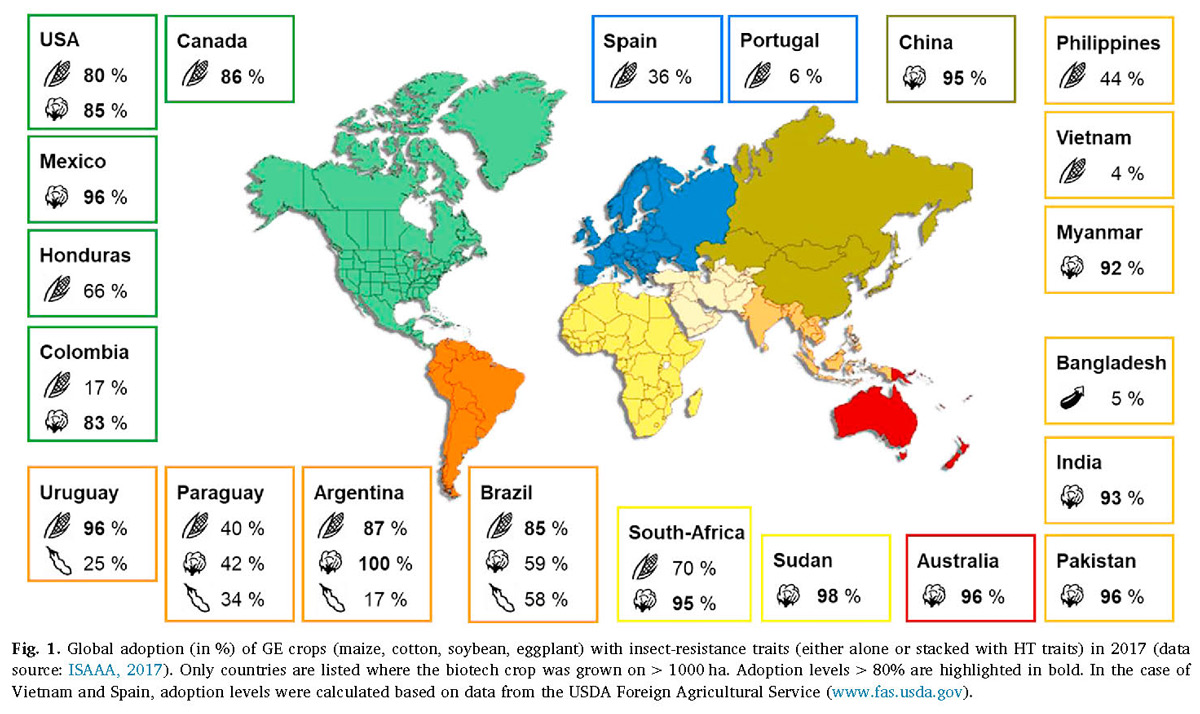More than one billion acres of farmland around the world have been used to grow crops that have been genetically engineered with proteins from the soil bacterium Bacillus thuringiensis (Bt).
The Bt protein’s insecticidal properties allow farmers to control pests without having to spray their fields with harmful chemicals. But the use of Bt crops has been criticized by opponents of agricultural biotechnology who say that they could have unintended effects on non-target organisms, including insects that may pose no danger to the crops but prey upon those do. This perceived threat has led to accusations that Bt crops damage ecosystems.
Now a comprehensive review recently published in the journal Biological Control concludes that in the 20-plus years that Bt crops have been grown on more than one billion acres — some 247 million acres in 2017 alone — there have been “no unintended adverse effects” to non-targeted species.
In fact, the authors conclude that “when Bt crops replace synthetic chemical insecticides for target pest control, this creates an environment supportive of the conservation of natural enemies.”
Bt technology is primarily applied to the field crops maize, cotton and soybean and has been widely adopted through large parts of the world. These Bt varieties are widespread in the Americas and Asia but much less so in Europe and Africa. In the US, for example, 80 percent of all corn (maize) and 85 percent of cotton have insect-resistant traits, while as little as four percent of the maize in Vietnam and just six percent of the maize in Portugal have the Bt gene.

Bt eggplant, known as brinjal throughout South Asia, was introduced to a handful of farmers in Bangladesh just five years ago and is now grown by more than 27,000 farmers across the country. It has been shown to reduce the dependence of Bangladeshi farmers on insecticides.
The Bangladeshi success story mirrors the global results of the Biological Control study, which was co-authored by researchers in Switzerland and the United States, including Cornell University entomologist Anthony Shelton.
The study’s authors conclude that “the efficacy of Bt-transgenic crops in controlling important target pests” such as the stemborers that attack maize, the bollworms that feed on cotton and the shoot borers that decimate brinjal yields has been “very high.” Not only that, the study appears to confirm recent research that insect-resistant crops create “a halo effect” that also benefits farmers who do not use the modified crops.
“The large-scale adoption of Bt crops in some parts of the world has led to area-wide suppressions of target pest population benefitting both farmers that adopted the technology and those that did not,” the researchers wrote.
At the conclusion of their comprehensive study, the researchers wrote that Bt crops provide “more effective biological control of both target and non-target pests” and reduce the need for insecticide application.
“Insect-resistant GE varieties can not only help to increase yields and provide economic benefits to farmers but also improve environmental and human health,” they wrote.
